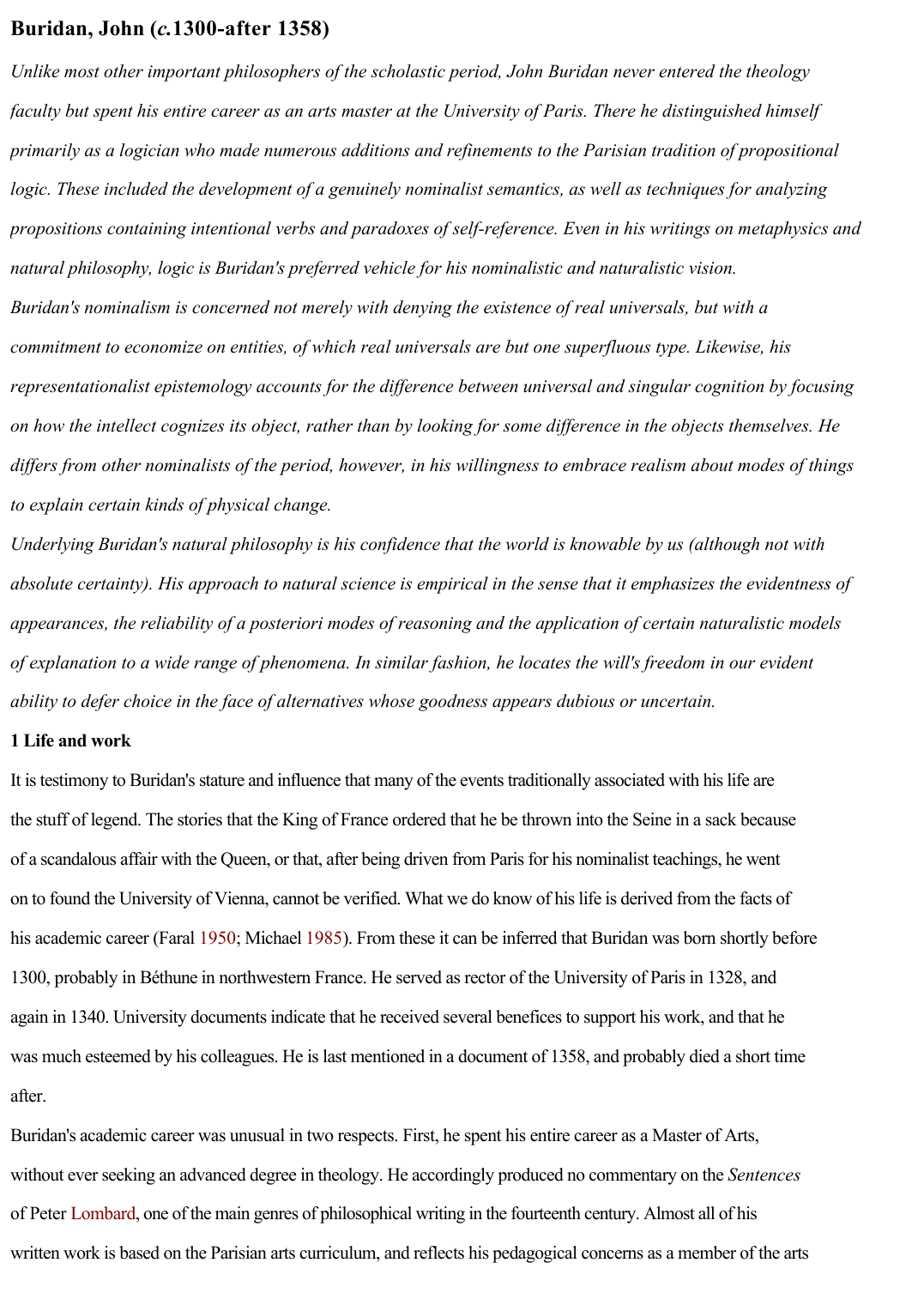Buridan, John
Publié le 16/05/2020

Extrait du document
«
Buridan, John ( c.1300-after 1358)
Unlike most other important philosophers of the scholastic period, John Buridan never entered the theology
faculty but spent his entire career as an arts master at the University of Paris.
There he distinguished himself
primarily as a logician who made numerous additions and refinements to the Parisian tradition of propositional
logic.
These included the development of a genuinely nominalist semantics, as well as techniques for analyzing
propositions containing intentional verbs and paradoxes of self-reference.
Even in his writings on metaphysics and
natural philosophy, logic is Buridan's preferred vehicle for his nominalistic and naturalistic vision.
Buridan's nominalism is concerned not merely with denying the existence of real universals, but with a
commitment to economize on entities, of which real universals are but one superfluous type.
Likewise, his
representationalist epistemology accounts for the difference between universal and singular cognition by focusing
on how the intellect cognizes its object, rather than by looking for some difference in the objects themselves.
He
differs from other nominalists of the period, however, in his willingness to embrace realism about modes of things
to explain certain kinds of physical change.
Underlying Buridan's natural philosophy is his confidence that the world is knowable by us (although not with
absolute certainty).
His approach to natural science is empirical in the sense that it emphasizes the evidentness of
appearances, the reliability of a posteriori modes of reasoning and the application of certain naturalistic models
of explanation to a wide range of phenomena.
In similar fashion, he locates the will's freedom in our evident
ability to defer choice in the face of alternatives whose goodness appears dubious or uncertain.
1 Life and work
It is testimony to Buridan's stature and influence that many of the events traditionally associated with his life are
the stuff of legend.
The stories that the King of France ordered that he be thrown into the Seine in a sack because
of a scandalous affair with the Queen, or that, after being driven from Paris for his nominalist teachings, he went
on to found the University of Vienna, cannot be verified.
What we do know of his life is derived from the facts of
his academic career (Faral 1950 ; Michael 1985 ).
From these it can be inferred that Buridan was born shortly before
1300, probably in Béthune in northwestern France.
He served as rector of the University of Paris in 1328, and
again in 1340.
University documents indicate that he received several benefices to support his work, and that he
was much esteemed by his colleagues.
He is last mentioned in a document of 1358, and probably died a short time
after.
Buridan's academic career was unusual in two respects.
First, he spent his entire career as a Master of Arts,
without ever seeking an advanced degree in theology.
He accordingly produced no commentary on the Sentences
of Peter Lombard , one of the main genres of philosophical writing in the fourteenth century.
Almost all of his
written work is based on the Parisian arts curriculum, and reflects his pedagogical concerns as a member of the arts.
»
↓↓↓ APERÇU DU DOCUMENT ↓↓↓
Liens utiles
- explication de texte: John Locke a écrit en 1690 un essai philosophique concernant l’entendement humain, nous allons analyser un extrait du livre II, chapitre 27, paragraphe 26
- John Steinbeck
- Saint-John Perse
- Saint-John Perse
- John Wain


